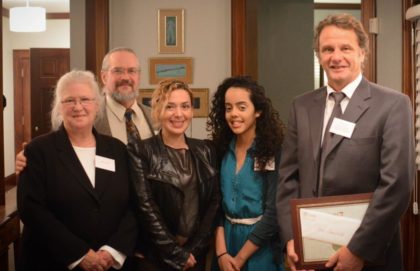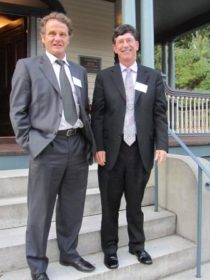
The Clark University community has developed a strong culture of engagement and partnership with the surrounding Main South neighborhood. On Oct. 9, Clark recognized a key partner in that mission, honoring J. Stephen Teasdale for his 25 years as Executive Director of the Main South Community Development Corporation (Main South CDC).
“At Clark, we talk about our success with our partnership in the community. We would not have come close to the success we have achieved without the inspiring leadership and drive of Steve Teasdale; Steve and the CDC have been there at every step,” said Jack Foley, Clark University Vice President of Government and Community Affairs. “They really have been the vehicle by which the community has been successful.”
The Main South CDC, a non-profit organization, was incorporated in 1986. The organization’s stated goal is “to improve the quality of life for ourselves, our families, and our neighbors by working together on projects and issues that will maintain and/or create safe affordable housing for low-to-moderate income individuals, support economic opportunities for businesses and residents of Main South, enhance the physical image of the area, and instill a sense of neighborhood pride and commitment.”
Foley presented Teasdale with a certificate and gift during a dinner and ceremony held at Harrington House, the home of President David Angel and his wife, Jocelyne Bauduy.
Foley highlighted some Main South CDC accomplishments under Teasdale’s leadership since 1988:
- 350 new or rehabbed units of housing
- 70 first-time home ownership opportunities
- $50 million in total CDC development costs, $30 million of this in grants
- Not one dollar derived from city’s tax levy, equaling $400,000 per year in real estate taxes to city
- Providing land for the $9 million Boys & Girls Club

Teasdale’s work goes “beyond bricks and mortar,” Foley added, tallying some of the CDC leader’s achievements on behalf of public safety and education, notably through the Woodland Academy advisory council and support for the University Park Campus School (UPCS). Teasdale has focused on economic development and jobs, hiring many neighborhood residents to work at CDC, on storefront development and in the acclaimed Youth Build training program in home building.
In his brief remarks, Teasdale thanked his “great staff and great board of directors.” He pointed to the culture instilled at Clark, one that “puts the institution ‘on the street,’ as I call it, and really is trying to make a difference.” Among his audience at the dinner were Clark’s Making a Difference Scholars and Lund Award winners, and Teasdale lauded them for their contributions to the community. “I hope you get as much satisfaction out of it as I have over the years,” he told them.
“Intelligence is not a factor of wealth,” Teasdale said. “We have a community here that tries to offer opportunities in the environment the kids grow up in. We try to provide the best economic opportunity that is available to them; to have a level playing field so they can succeed as they grow up as well.
“I’m excited about the future partnerships that we are engaged in at Clark at the moment — with Nancy (Budwig, Associate Provost) and with Tom (Del Prete, director of the Adam Institute) — to look to try and improve these neighborhood schools. I think that’s the next step in the community that we need to focus on.”
Beyond his work at the CDC, Teasdale is on the board of the Worcester Business Development Corporation and the LIFE Initiative. In June, he received the “Excellence in Community Development Award” from the Massachusetts Housing Investment Corporation (MHIC). He also coaches rugby, currently at the College of the Holy Cross.
“There are dozens of Clark students who have worked with Steve and others at the CDC and gained great experiences there, and many of those students have gone on to wonderful careers in community development,” Foley said. “He exemplifies the belief that an individual who is dedicated to a cause can make a real difference in this community and in the city of Worcester.”
Founded in 1887 in Worcester, Massachusetts, Clark University is a small, liberal arts-based research university addressing social and human imperatives on a global scale. Nationally renowned as a college that changes lives, Clark is emerging as a transformative force in higher education today. LEEP (Liberal Education and Effective Practice) is Clark’s pioneering model of education that combines a robust liberal arts curriculum with life-changing world and workplace experiences. Clark’s faculty and students work across boundaries to develop solutions to complex challenges in the natural sciences, psychology, geography, management, urban education, Holocaust and genocide studies, environmental studies, and international development and social change. The Clark educational experience embodies the University’s motto: Challenge convention. Change our world. www.clarku.edu
